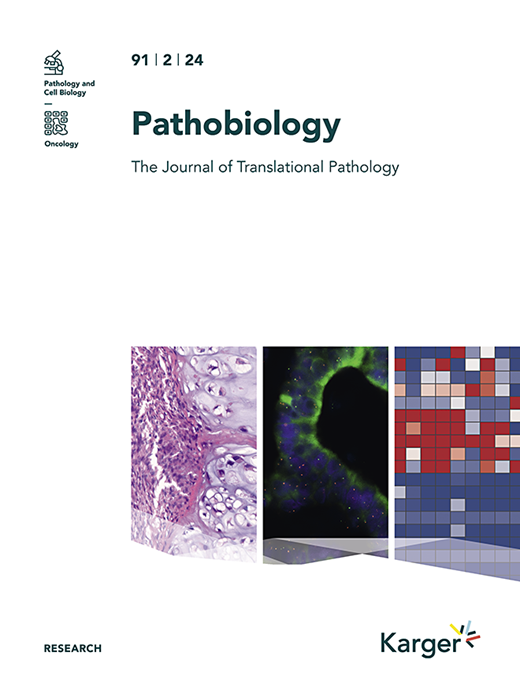原钙粘蛋白B9与结直肠癌的肿瘤发生和癌症进展相关
IF 3.5
4区 医学
Q3 CELL BIOLOGY
引用次数: 1
摘要
背景:在癌细胞中特异表达的跨膜蛋白编码基因可能是理想的治疗靶点或诊断的生物标志物。方法:研究编码跨膜蛋白原钙粘蛋白B9的PCDHB9在结直肠癌(CRC)中的表达及功能。结果:148例结直肠癌患者中39例(26%)原钙粘蛋白B9阳性。原钙粘蛋白B9的表达与淋巴浸润、静脉浸润和T分类相关,在腺瘤中免疫组化检测较弱。虽然PCDHB9敲低并未改变CRC细胞系细胞的生长和侵袭活性,但PCDHB9敲低可显著降低细胞对纤维连接蛋白的粘附。PCDHB9下调后,ITGA3、ITGA4、ITGA5、ITGB1、ITGB6的表达明显降低。此外,PCDHB9基因敲除后,微球数量明显减少。结论:这些结果提示原钙粘蛋白B9可能与结直肠癌的结直肠肿瘤发生和癌症进展有关。本文章由计算机程序翻译,如有差异,请以英文原文为准。
Protocadherin B9 Is Associated with Tumorigenesis and Cancer Progression in Colorectal Cancer
Background: Genes encoding transmembrane proteins expressed specifically in cancer cells may be ideal therapeutic targets or biomarkers for diagnosis. Methods: In the present study, we investigated the expression and function of PCDHB9, which encodes transmembrane protein protocadherin B9 in colorectal cancer (CRC). Results: Immunohistochemical analysis showed that 39 (26%) of 148 CRC cases were positive for protocadherin B9. Expression of protocadherin B9 correlated with lymphatic invasion, venous invasion, and T classification and was weakly detected in adenomas by immunohistochemistry. Although PCDHB9 knockdown did not change cell growth and invasion activity in CRC cell lines, cell adhesion to fibronectin was significantly reduced by PCDHB9 knockdown. Expressions of ITGA3, ITGA4, ITGA5, ITGB1, and ITGB6 were significantly reduced by PCDHB9 knockdown. In addition, the number of spheres was significantly decreased by PCDHB9 knockdown. Conclusion: These results suggest that protocadherin B9 might be associated with colorectal tumorigenesis and cancer progression in CRC.
求助全文
通过发布文献求助,成功后即可免费获取论文全文。
去求助
来源期刊

Pathobiology
医学-病理学
CiteScore
8.50
自引率
0.00%
发文量
47
审稿时长
>12 weeks
期刊介绍:
''Pathobiology'' offers a valuable platform for the publication of high-quality original research into the mechanisms underlying human disease. Aiming to serve as a bridge between basic biomedical research and clinical medicine, the journal welcomes articles from scientific areas such as pathology, oncology, anatomy, virology, internal medicine, surgery, cell and molecular biology, and immunology. Published bimonthly, ''Pathobiology'' features original research papers and reviews on translational research. The journal offers the possibility to publish proceedings of meetings dedicated to one particular topic.
 求助内容:
求助内容: 应助结果提醒方式:
应助结果提醒方式:


